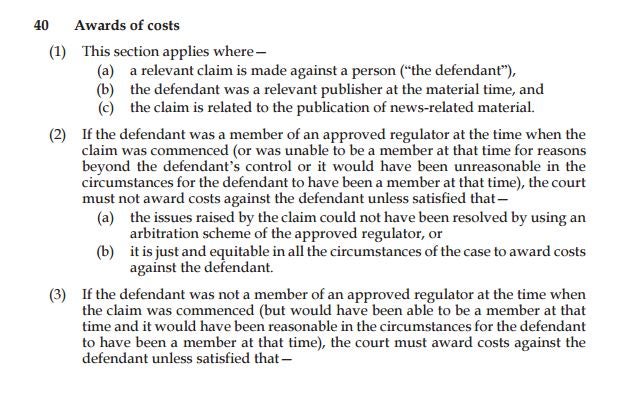
The new government consultation on Section 40 opens the way for the press regulation costs penalties law to be thrown out altogether or watered down.
The ten-week consultation has been welcomed by editors and publishers but condemned by press reform campaigners.
Section 40 of the Crime and Courts Act was passed by Parliament in 2013 but the current Conservative Government has refused to commence it.
Yesterday, Culture Secretary Karen Bradley announced the consultation as the House of Commons rejected a bid by the House of Lords to tag a version of Section 40 on to the Investigatory Powers Bill.
Many newspaper publishers strongly oppose Section 40 because it could greatly increase the cost of libel and privacy claims by making them pay both sides’ costs even if they win in court.
Joining Royal Charter-backed press regulator Impress would protect publishers from paying libel and privacy claimants’ legal costs under Section 40, but would force them into a low-cost arbitration scheme.
Under this scheme legal claimants pay only a small admin fee but publishers must pay costs of up to £6,500 plus any damages.
The four options under consideration under the consultation (full details here) are as follows:
- Continue to keep matters under review to determine an appropriate time for commencement of Section 40
- Make a commencement order to bring section 40 into force in its entirety
- Repeal section 40
- Commence only those sub-sections of section 40 that would give protections to members of a recognised self-regulator. This would provide an incentive to join Impress, but no extra penalties for those outside the Royal Charter-backed regulator.
The consultation is also considering whether to hold part two of the Leveson Inquiry, looking into phone-hacking and relations between journalists and the police.
Setting out the case against the need for Leveson part two, the Government has pointed out that four police investigations into journalists have been carried out over the last five years: Elveden (payments), Tuleta (computer hacking), Weeting and Golding (phone-hacking).
The Government notes that these investigations cost £43.7m of public money and resulted in 40 convictions including: 11 police officers and police staff, 19 public officials and ten journalists. It also points out that the first part of the Leveson Inquiry cost £5.4m.
Publishers’ body the News Media Association said yesterday: “The NMA welcomes the decisive vote by MPs today to stand up for a free press and strike out the Lords’ amendment to the Investigatory Powers Bill.
“It would have imposed punitive costs sanctions against newspapers through the back door and would have had a crippling effect on the local press.
“The Leveson Report called for effective self-regulation of the press, not statutory regulation. We hope the consultation on press regulation announced by the Culture Secretary will demonstrate that IPSO offers just that and why Section 40 of the Crime and Courts Act should be repealed.”
Society of editors executive director Bob Satchwell said the new consultation “makes sense” adding: “The Leveson Inquiry took place more than four years ago and inquired into events that had happened a decade or more ago.
“The Independent Press Standards Organisation has been in operation for two years and has already strengthened regulation and changed the behaviour of the press dramatically.
“It covers the vast majority of newspapers and magazines who are signed up to its already toughened systems of governance. All of the significant publishers will not contemplate joining the imposed Royal Charter system which is a gateway to political interference.
“Over the past decade the economic and competitive background has also changed dramatically. It would be dangerous to open up local and regional papers particularly with threats of legal action – the costs of which they would have to pay even if they won a case, and which could put them out of business.”
But Hacked Off, the group set up to campaign for the victims of press intrusion, has condemned yesterday’s developments.
Executive director Evan Harris said: “This ‘consultation’ is no more than an attempt by the Government to re-run the Leveson Inquiry, but with a conflicted Government Minister replacing an independent Judge. That is the last way decisions over press regulation should be taken.
“Leveson Part Two is to look into evidence of corruption into police and the press, and a series of cover-ups. It is almost unthinkable that a Prime Minister who claims to be willing to stand up to police and corporate interests would even consider postponing let alone cancelling an inquiry into cover-ups and corruption in our major national institutions.
“This consultation will not change the fact that the Government gives every impression of being in hock to powerful press interests and ignoring not just the victims of press abuse, but the fact that promises were made under oath at a public inquiry and to Parliament in the Cross-Party Agreement.”
Email pged@pressgazette.co.uk to point out mistakes, provide story tips or send in a letter for publication on our "Letters Page" blog
